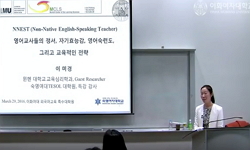본 연구는 자기효능감이 발언행동으로 이어지는 메커니즘과, 이들 변수들 사이의 관계를 강화하는 변수들을 연구하고자 한다. 좀 더 구체적으로 살펴보면, 자기효능감이 정서적 조직몰입을...
http://chineseinput.net/에서 pinyin(병음)방식으로 중국어를 변환할 수 있습니다.
변환된 중국어를 복사하여 사용하시면 됩니다.
- 中文 을 입력하시려면 zhongwen을 입력하시고 space를누르시면됩니다.
- 北京 을 입력하시려면 beijing을 입력하시고 space를 누르시면 됩니다.

자기효능감과 발언행동: 조직지원인식과 성취욕구의 강화 효과 = Self-Efficacy and Voice Behavior: The Reinforcement Effects of Perceived Organizational Support and Needs for Achievement
한글로보기https://www.riss.kr/link?id=A109747523
- 저자
- 발행기관
- 학술지명
- 권호사항
-
발행연도
2025
-
작성언어
Korean
- 주제어
-
등재정보
KCI등재
-
자료형태
학술저널
- 발행기관 URL
-
수록면
1023-1041(19쪽)
- 제공처
-
0
상세조회 -
0
다운로드
부가정보
국문 초록 (Abstract)
사회인지이론에 따르면 자기효능감이 성과를 향상시키고 성과향상이 직무만족을 증가시킨다고 주장하였으나, 본연구는 사회적 교환의 정서이론(affect theory of social exchange)의 정서적 유대라는 개념을 활용하여 자기효능감이 정서적 조직몰입을 증가시키고, 이것이 발언행동을 유발한다는 메커니즘을 제시하고 있다. 또한 기존연구에서는 자기효능감과 조직몰입 사이의 관계, 조직몰입과 발언행동 사이의 관계를 변화시킬 수 있는 조절변수에 대한 연구가 거의 이루어지지 않았으나, 본 연구에서는 조직지원인식과 성취욕구가 그러한 조절변수로서 역할할 수 있다는 것을 검증함으로써 자기효능감과 관련된 연구에 기여하고 있다.
본 연구는 자기효능감이 발언행동으로 이어지는 메커니즘과, 이들 변수들 사이의 관계를 강화하는 변수들을 연구하고자 한다. 좀 더 구체적으로 살펴보면, 자기효능감이 정서적 조직몰입을 증가시키고, 정서적 조직몰입이 발언행동을 촉진할 것으로 예측한다. 한편으로는 직원들의 조직지원인식과 성취욕구가 이 변수들 사이의 관계를 강화하는 조절변수로 설정되었다. 이 모형을 검증하기 위하여 2024년에 중국의 한 대기업에서 실시된 설문조사를 분석하였다. 다중회귀분석으로 분석한 결과들에 따르면, 자기효능감이 높은 직원일수록 정서적 조직몰입 수준이 높았고, 정서적 조직몰입이 높은 직원들이 발언행동을 많이 하는 것으로 나타났다. 또한 직원들의 조직지원인식이 높을수록 자기효능감과 정서적 조직몰입 사이의 관계가 강화되었고, 성취욕구가 강한 직원일수록 정서적 조직몰입과 발언행동 사이의 관계가 강화되었다. 이러한 연구 결과들은 자기효능감과 관련된 연구에 많은 시사점을 제공한다.
사회인지이론에 따르면 자기효능감이 성과를 향상시키고 성과향상이 직무만족을 증가시킨다고 주장하였으나, 본연구는 사회적 교환의 정서이론(affect theory of social exchange)의 정서적 유대라는 개념을 활용하여 자기효능감이 정서적 조직몰입을 증가시키고, 이것이 발언행동을 유발한다는 메커니즘을 제시하고 있다. 또한 기존연구에서는 자기효능감과 조직몰입 사이의 관계, 조직몰입과 발언행동 사이의 관계를 변화시킬 수 있는 조절변수에 대한 연구가 거의 이루어지지 않았으나, 본 연구에서는 조직지원인식과 성취욕구가 그러한 조절변수로서 역할할 수 있다는 것을 검증함으로써 자기효능감과 관련된 연구에 기여하고 있다.
다국어 초록 (Multilingual Abstract)
Furthermore, while previous research has seldom examined moderating variables that could influence the relationships between self-efficacy and organizational commitment, as well as between organizational commitment and voice behavior, this study contributes to the field by proposing that perceived organizational support and needs for achievement may serve as significant moderating variables.
This study aims to investigate the mechanisms linking self-efficacy to voice behavior and the conditions that may strengthen these relationships. More specifically, it posits that affective organizational commitment mediates the relationship between s...
This study aims to investigate the mechanisms linking self-efficacy to voice behavior and the conditions that may strengthen these relationships. More specifically, it posits that affective organizational commitment mediates the relationship between self-efficacy and voice behavior. In addition, we propose a model in which employees’ perceived organizational support and needs for achievement serve as moderating variables. Data from a survey conducted in 2024 at a large company in China was analyzed to examine this model. The results from multiple regression analyses revealed that employees with higher self-efficacy exhibited increased levels of affective commitment, which in turn led to greater voice behavior. Furthermore, the relationship between self-efficacy and affective commitment was stronger when perceived organizational support was higher, and the relationship between affective commitment and voice behavior was more pronounced when the needs for achievement was greater. These findings provide valuable insights into the research on self-efficacy. Social cognitive theory suggests that self-efficacy improves performance, subsequently increasing job satisfaction. However, this study highlights mechanisms by which self-efficacy enhances employee behavior through their attitudes. By incorpoating the concept of the affective bonds from the affect theory of social exchange, it elucidates how self-efficacy can elevate affective commitment.
Furthermore, while previous research has seldom examined moderating variables that could influence the relationships between self-efficacy and organizational commitment, as well as between organizational commitment and voice behavior, this study contributes to the field by proposing that perceived organizational support and needs for achievement may serve as significant moderating variables.
동일학술지(권/호) 다른 논문
-
- 대한경영학회
- 김진영
- 2025
- KCI등재
-
한국 제조기업의 디지털 전환 인식과 혁신성과 간의 비선형적 관계: 도입 수준과 대응 수준의 조절효과
- 대한경영학회
- 허아정
- 2025
- KCI등재
-
DEI 정책이 직무만족에 미치는 영향: 고용브랜드와 조직충성도의 다중매개효과를 중심으로
- 대한경영학회
- 정아현
- 2025
- KCI등재
-
토픽 모델링과 Q방법론을 활용한 신규 소비 트렌드 특성 분석: YONO 소비 트렌드를 중심으로
- 대한경영학회
- 이민용
- 2025
- KCI등재




 KCI
KCI



